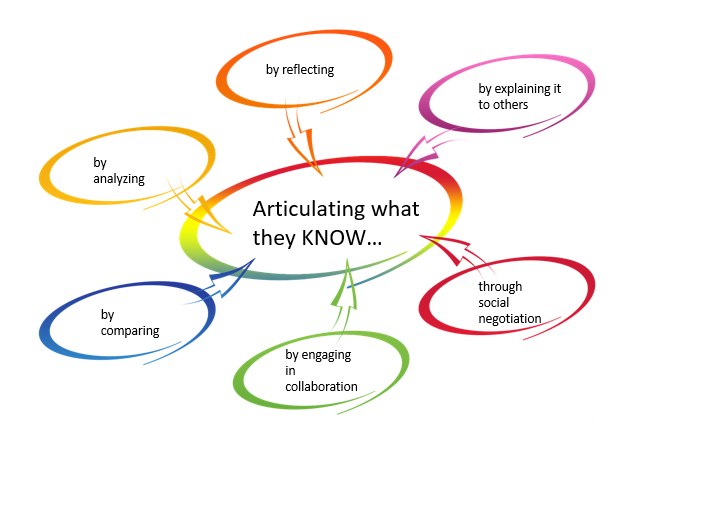18 Discussion Board
The discussion board is the heart of your learning community and needs to be tended to cultivate community, promote meaningful discourse and create a peer-learning environment. In addition to online courses, you can use the discussion board in the traditional, flipped, and hybrid classroom and this content pertains to all of them.
Meaningful discourse on the online discussion board depends on the collaboration of students and the use of discussion board questions that allow students to test their ideas against one another to gain new understanding. Students need to use the discussion board to articulate what they know, as seen in the image below, to create meaningful discourse on the discussion board.

However, meaningful discourse doesn’t happen overnight. The instructor needs to cultivate the learning environment by creating well-written discussion board questions. The questions need to allow students to create thoughtful answers that call on their prior knowledge and experience, interpreting content, synthesis, inferences, and evaluation of their and peer understanding of the topic in order to create meaningful discourse.
Some examples of types of questions that set the stage for meaningful discourse are:
- Posing questions and tasks that elicit, engage, and challenge each student’s thinking.
- Asking students to clarify and justify ideas.
- Encouraging and accepting multiple answers or partial answers and asking to build onto them.
Guidelines for writing questions:
- Don’t ask only yes or no types of questions. This type of question does not require critical thinking or give students material to respond to each other on the discussion board.
- Don’t use questions that have a factual answer with no room for discussion. The same issues as yes or no questions arise when you ask questions factual answer questions. There is no room for discussion because students report mostly the same thing. Save these for your assessments!
- Do write questions that target reflection, interpretation, analysis, or problem-solving. This type of question gives your students a more meaningful learning experience. Some examples of this type of question are questions that have students analyze a case study, interpret interactions/ content in a scenario, and questions that state a problem and ask students to solve based on content, experience, etc.
- Do ask questions that solicit relevant personal experiences and opinions by tapping into the prior knowledge the students bring, allowing them to become resources for learning. You can have them tie their real-world experiences to the content to give it more meaning and allow others as an additional learning experience.
- Do ask questions that encourage students to engage with other students in the class by framing them to elicit discussion. For example, your first response is… and your second is evaluating and commenting on your peer’s post.
- Do ask questions that require connections to be drawn between past and present course material giving your students the opportunity to tie concepts together and build on previous knowledge.
- Do ask questions that prompt students to generate lists of information or create research or data together as a class or in smaller group discussions.
The instructor’s role in the discussion board is to:
- Decide when to provide information, when to clarify an issue, when to model, when to lead and when to let students wrestle with difficulty.
- To monitor participation and encourage each student to participate.
- To be present in the online discussion board.
